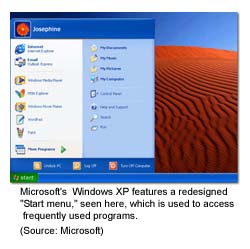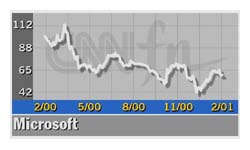|
Microsoft demos new OS
|
 |
February 13, 2001: 3:20 p.m. ET
Windows XP seen as a potential catalyst for the sluggish consumer PC segment
|
NEW YORK (CNNfn) - Microsoft Corp. on Tuesday took the wraps off its latest computer operating system software, which some industry observers say could give a lift to flagging consumer PC sales when it is introduced to the mass market in the latter half of this year.
Executives gave the public its first glimpse of the new operating system, called Windows XP, at a press conference in Seattle. The new software, formerly code-named "whistler," is aimed in large part at consumers, but a business version will be made available as well.
Windows XP has been designed with more emphasis on multimedia features such as Web publishing and streaming audio and video. It was built on the same platform as Microsoft's Windows 2000 operating system and is the first consumer operating system since Windows 95 that has an entirely new underlying code base. 
It also sports some changes to the user interface, including: features that make it easier to create individual accounts for multiple users of a single computer; a redesigned "Start menu" that makes it easier to access the frequently used programs; and a utility that makes it easier to view and manage digital photographic images.
The new product is tied closely to Microsoft's ".NET" strategy, under which it is hoping to expand its Windows franchise into the age of the Internet. Microsoft's Windows operating system software currently powers the vast majority of the world's desktop computers. But Microsoft executives recently have been steering the business toward a more "platform agnostic" approach.
With the .NET strategy, Microsoft (MSFT: Research, Estimates) is aiming to extend its reach by designing software products that can be used on any computing platform and on any device, not necessarily a Windows-based PC.
"People want to do more and more with their PCs," said Bill Gates, Microsoft's chairman and chief software architect. "Windows XP builds on their dreams, taking the power and adaptability of the PC to a new level."
Under Microsoft's vision, a Windows XP-based PC will remain the center of the computing universe as the use of alternative devices such as handheld computers and so-called "information appliances" becomes more prevalent.
Of course, Microsoft is not the only one promoting a platform-agnostic computing model for the next phase of the Internet era. Sun Microsystems Inc.'s (SUNW: Research, Estimates) "Java" programming language also works on any number of devices and stands as a major rival to Microsoft's .NET vision. Sun, among others, envisions a future where all the computing power is on the network and applications can be accessed through a range of devices.
Some industry watchers have identified Microsoft's latest operating system as a potential catalyst for PC sales, growth of which has fallen sharply, especially in the fourth quarter of 2000.
 Merrill Lynch's Henry Blodget, who is the firm's Internet analyst but recently assumed coverage of Microsoft in light of its new business focus, said Tuesday that any upside potential of the new operating system has likely already been figured into the market's current growth expectations. Merrill Lynch's Henry Blodget, who is the firm's Internet analyst but recently assumed coverage of Microsoft in light of its new business focus, said Tuesday that any upside potential of the new operating system has likely already been figured into the market's current growth expectations.
"It is the first consumer operating system in recent years that has an entirely new code base, so it is expected to be more reliable," Blodget said in a note to clients Tuesday. "We view this as a 'nice to have' feature, not a 'must have.'"
Blodget said he does not expect the introduction of Windows XP to create much incremental upgrade demand, meaning few consumers will go out and buy the new operating system for their existing PCs. He said it might cause a slight increase in consumer PC sales as people who have held off buying find it a compelling reason to do so.
"We believe, therefore, that the financial impact of Windows XP is already in the Street models, including ours," Blodget said. When he assumed coverage of Microsoft last week, Blodget downgraded its shares to "accumulate" from "buy," saying that the company's current dependence on the desktop computer market will make it difficult to post accelerating earnings growth.
Goldman Sachs analyst Rick Sherlund, who maintained his "market outperform" rating on Microsoft shares Tuesday, said the new operating system could have a strong consumer appeal.
"This could help stimulate demand for software and PC upgrades late this calendar year and next year," Sherlund said.
Microsoft shares were up 69 cents at $59.44 in afternoon Nasdaq trade Tuesday. 
|
|
|
|
|
 |

|

